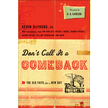Are you an evangelical? Before you answer that question, maybe we need to define what exactly an evangelical is. Is it synonymous with Christianity? Conservative Christianity? American Christianity? Protestant Christianity? Clueless Christianity? In a day of anything-goes evangelicalism a cadre of younger evangelicals has put their heads together to attempt to bring some degree of clarity to the confusion surrounding engimatic evangelicalism. Following is a review of the book, Don’t Call It a Comeback.
 |
Don’t Call It a Comeback: The Old Faith for a New Day
By Edited by Kevin DeYoung / Crossway Books & Bibles |
Buy the book now and get $5 off.
Overview of the Book
The product of their labor is a book called Don’t Call it a Comeback: The Old Faith for a New Day (Crossway, 2011). The title, pugnacious or edgy as it may seem, does not totally describe what you’ll find in the 240-ish page book. Half theology and half Christian living handbook, Don’t Call it a Comeback is a book with two goals: 1) “To unpack what Christians ought to believe and how they ought to act…and 2) to articulate the essentially theological nature of evangelicalism” (from the foreword by D.A. Carson).
The book begins with a quick peek into some tips on reaching the current generation (“The Secret to Reaching the Next Generation,” Kevin DeYoung), and a flyover history of evangelicalism (“The Story of Evangelicalism from the Beginning and Before,” Collin Hansen). Following a brief Part 1, the authors move on to discuss some of the core beliefs of evangelicals: theology proper (“God: Not Like You,” Jonathan Leeman), Christology (“Jesus Christ: The Only Way and Our Only Hope,” Tim Challies) bibliology (“Scripture: How the Bible is a Book Like No Other,” Andy Naselli), a few chapters on soteriology (“The Gospel: God’s Self-Substitution for Sinners” by Greg Gilbert, “New Birth: ‘You Must be Born Again,'” by Ben Peays, “Justification: Why the Lord Our Righteousness is Better News than the Lord Our Example” by Jay Harvey) and the Kingdom (“Kingdom: Heaven after Earth, Heaven on Earth, or Something Else Entirely?” Russell Moore). The section on theology is solidly biblical and conservatively aligned. It provides an accessible, refreshing, and devotional read.
In the remainder of the book, the authors turn to the potentially inflammatory topics of contemporary life. Issues as relevant as one’s vocation (“It’s Sometimes a Wonderful Life: Evangelicals and Vocation,” Ted Kluck) as intriguing as social justice (“Social Justice: What’s God Got to Do, Got to Do with It,” Darrin Patrick), and as incendiary as Homosexuality (“Homosexuality: Grace, Truth, and the Need for Gentle Courage,” Eric Redmond and Kevin DeYoung) are all treated in individual chapters, along with the topics of abortion, gender confusion, worship, and missions.
Disagreement, Anyone?
In a book with 22 authors, there is bound to be something you’ll disagree with. Some may take issue with what’s been included and what’s been left out. Others may argue about the obvious reformed tilt in the theological chapters. Others may complain that the writers weren’t broad enough in their acceptance of who’s in and who’s out when it comes to evangelicals. All of these objections are to be expected. When it comes to polarizing topics, people will be polarized. Do the authors make the evangelical club too small? Contrast this with a book like Everything You Know About Evangelicals is Wrong, Well Almost Everything (Wilkens and Thorsen). These authors turn “evangelicalism” into a dragnet term that pulls in just about everybody, regardless of where they land on the far reaches of the theological spectrum.
As editor Kevin DeYoung explained in the introduction to the book, “This book is an attempt to suggest some of the doctrines, ethics, and practices that ought to mark out the evangelical Christian. But we realize for some folks we have not weighed in on enough issues, and for others we spouted off too many. Our goal is not to say, ‘Believe this or else,’ or ‘Believe this and nothing else,’ but to say, ‘Here are the things that seem most essential and basic to the Christian faith in general and evangelical identity in particular.'” DeYoung’s irenic tone and gracious gesture is not pandering nor is it belligerent. It is an appropriate “betweeness,” that sets the book off on the right tone.
One of the advantages (and risks) of writing about the rubber-meets-the-road topics of Christian living is that you’re informing people about how the Bible intersects with daily life. The risk of course, is that someone may disagree with the fact that you’ve put a stoplight at that intersection. The authors have not attempted to be the evangelical whistle-blowers—figuring out who’s “in” and who’s “out,” but they have provided solidly biblical answers to the issues with which evangelicalism is grappling.
Features—Present and Lacking
The book could use an epilogue. A tidy introduction by D. A. Carson (the only gray-haired contributor; he wrote wrote the foreword) is helpful, but I found that my mind was gearing up for a winddown and wrap up session as I approached the end of the book. Unfortunately, I came to a lurching to a halt when the book concluded. Don’t get me wrong. The conclusion (“Missions: The Worship of Jesus and the Joy of All Peoples” by David Mathis) was among my favorite chapters. It was a majestic theme which provided a powerful application on which the book could close. My complaint, however, is that there was nothing at the end to tie together the book as whole—an “okay, now what?” sort of deal.
For all its emphasis upon “evangelicalism” and “evangelicals,” I found myself wondering, what is the difference between a Christian and an Evangelical? Is evangelicalism a subset of Christianity? If so, are there good Christians who aren’t evangelicals? What do they look like? Do they adopt evangelical theology, or is there a different, yet legitimate kind of theology that they embrace? Some of my musing is of course facetious, but rather than answer all my questions about evangelical identity, the book raised some new ones.
The book is full of positive features. As mentioned before, each of the authors writes in a way that is absolutely understandable. Without sacrificing precision and accuracy, the authors penned their respective essays in a way that is concise, clear, and anecdotal. I even had some LOL moments while reading Ted Kluck’s chapter on vocation. The book is an ideal read for younger evangelicals and even for new Christians who are trying to get a handle on Christian doctrine and Christian living.
Although I say that the book is “good for the newbies,” I am not being condescending. In fact, yet another commendation is in order. Although it’s entirely readable by just about anyone, informed and uninformed, the book does a fantastic job of dealing with the issues, both theological and practical, in a comprehensive and convincing way. The chapters are comprehensive because they don’t deal with every nitpicky issue that may fall under their given topic. The material is convincing because they do deal with popular objections and areas of potential confusion. For example, Andy Naselli’s chapter on Scripture doesn’t go into a detailed discussion of canonicity, but it does deal with three common objections regarding bibliology. DeYoung and Redmond, authors of the chapter on homosexuality, don’t deal with the issue of monogamous homosexual relationships, but they do solidly counter five common objections to a biblical view of homosexuality. Being somewhat informed about these objections, I read the book with the “devil’s advocate” approach, trying to find out where the book leaked and where it was watertight. I found it to be watertight.
Conclusion
No book is perfect, and Don’t Call it a Comeback hasn’t proved that maxim wrong. Anytime you assemble nearly two dozen authors to contribute essays on a difficult topics, you’ll find minor areas in which you may disagree. The book isn’t about what Christians should disagree on, however. Instead, it shows us the rallying points for Christians to rejoice over. It shows us the biblically-based daily choices that cohere with biblical living. As a whole the book furnishes evangelicals with a handy tool that combines readable theology with practical lifestyle guidelines, equipping believers to defend and live out their faith.

